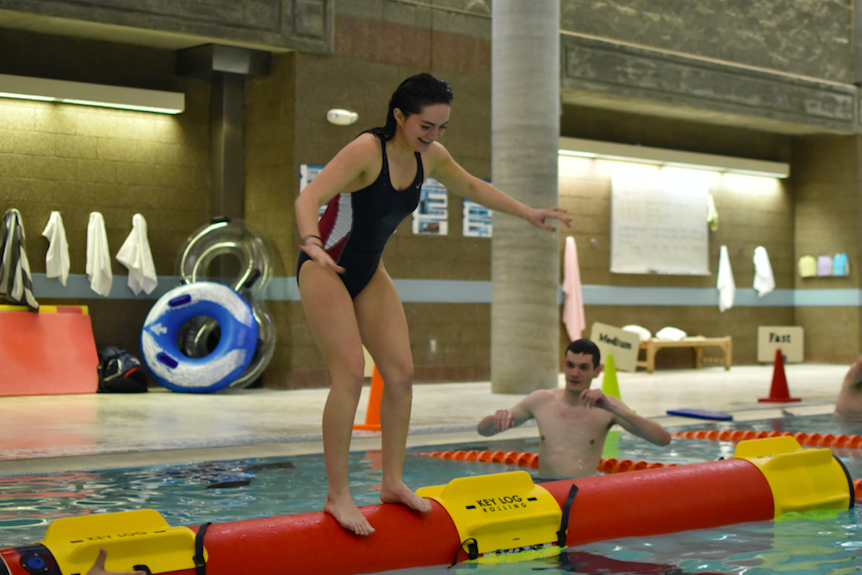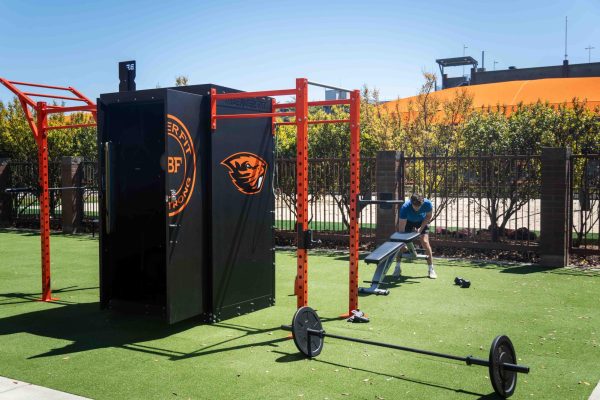Log Rolling: Not just for lumberjacks
February 21, 2019
Tension builds as your feet slip and slide, slowly losing their grip, a quick jolt of motion and the log you’re precariously balanced on flies out from under you. Water splashes up and around, catching your body as it falls. This is the sport of log rolling.
Log rolling is a balance based, physical fitness activity. A log, real or synthetic, is placed in a body of water. Then people try to run on top of it for as long as possible before falling off. According to Self Magazine, log rolling was one of the top 10 fitness trends in 2018 and Dixon Recreation Center at Oregon State University has instructors available to teach students the basics of log rolling. These basics range from getting on the log, front and back steps and how to spar against a partner.
For a little over two years people have been showing up every evening to participate in the activity. Kari Miller, Scheduling and Events Coordinator for OSU’s recreational sports, talked about how OSU has offered log rolling as an activity at Dixon Pool.
“We average anywhere from two to six individuals each evening, but hope to find more interested students willing to be bold and try this unique sport,” Miller said.
No experience is required. All you need is a curious mind. Log rolling has a max of eight participants per session and no registration is needed. According to the OSU website, the cost is $3 for students and members of Dixon, $5 for the OSU community and $7 for the general public.
Log rolling is a learning experience that focuses on balance rather than competition. Though that doesn’t mean you can’t compete on a larger scale if you fall in love with the activity. OSU’s Forestry Club has students who compete in log rolling competitions.
“Log Rolling is more of a learning experience and exercise in balance for most, however we do have a vibrant group of Forestry Club students who compete regionally and nationally in Logging Sports competitions which include log rolling (technical name: ‘Birling’) as one of the events,” Miller said. “Birling matches two individuals on a floating log and contestants try to knock their opponent off of the log through strategic footwork.”
Key Log Rolling is a company that worked with a team of engineers to create a synthetic log light enough to transport and share this sport anywhere in the world. According to the Key Log Rolling website, the sport began in the late 1800s during the great logging era. America used rivers as a transport system to move the timber from remote areas to sawmill towns. The thousands of logs traveling down river frequently jammed so men were hired to prevent the jams. These men would work the river, stepping on the floating logs as they worked from one end of the river to the other. The loggers started to challenge one another to see who could stay on the logs the longest. It wasn’t long before lumber companies started sponsoring competitions.
OSU celebrates the local heritage of timber sports. It is one of the few locations in Oregon that host indoor log rolling. If you’re on the fence about trying out the sport, Miller recommends coming into Dixon and giving it a shot, saying it is both a fun and challenging sport to master.
“Log Rolling is an experience that celebrates the local heritage of timber sports in a safe and warm indoor environment and one of the few indoor log rolling locations in Oregon (there are only three others),” Miller said. “It’s both challenging and fun as you master the stance, balance and fall back into the water–respectively.”
For more information on log rolling and its availability at Dixon, please visit http://recsports.oregonstate.edu/



















